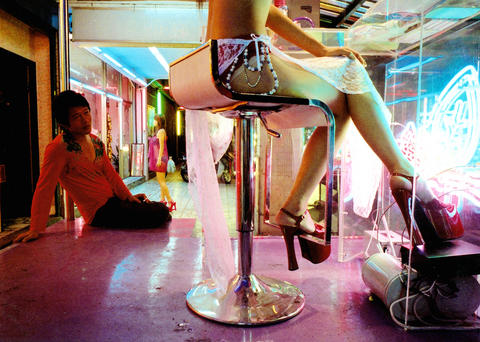Actor Lee Kang-sheng (李康生), muse to filmmaker Tsai Ming-liang (蔡明亮) for more than a decade, returns to the director's chair five years after his debut feature The Missing (不見). Adhering to his mentor's brand of cinema, Help Me Eros (幫幫我愛神) reflects on the anomie engendered by consumer culture through a kinky hodgepodge of sex, food, marijuana and betel nut beauties.
At the center of the modern fable lies Ah Jie (played by Lee), who, after losing all his money on the stock market, seeks relief by smoking joints rolled from the marijuana plants he grows in the wardrobe in his repossessed apartment. He calls a help line every once in a while to look for comfort from Chyi (Liao Hui-chen, 廖慧珍), a volunteer counselor whose fleshy figure remains hidden on the other side of the line.
When Ah Jie isn't stalking an attractive young woman he thinks is Chyi, he is sexually engaged with Shin (Yin Shin, 尹馨), a new girl working at the betel nut stand near his apartment. The erotic and psychedelic trips soon involve four other scantily clad betel nut girls (played by the F4 girls) in a series of sexual antics.

PHOTO: COURTESY OF HOME GREEN FILMS
Meanwhile, the real Chyi isn't having the time of her life either, trapped in a marriage with a gay TV cooking show host (Dennis Nieh, 聶雲), who has fattened her up with gourmet food.
Ah Jie sells everything he has left to play the lottery, but loses. When Shin walks out on him, he makes a last call to the help line wondering if he is beyond redemption.
The televised image of a trout being prepared and eaten alive in the cooking show opens the film and sets the tone. Striking visuals drive the loosely woven tale of the societal vices with a rich personal tang. Images - designer brand logos projected onto the group-sex hedonists, lottery tickets raining down on the street where hopes and dreams wane - are bold, straightforward and deliver the message with a vulgar charm, though they sometimes run the risk of pushing the film into languid self-indulgence.

PHOTO: COURTESY OF HOME GREEN FILMS
One of these indulgences, which the film takes pride in, is pot smoking. Marijuana is the source of redemption in the lost man's sealed heaven. One of the film's few humorous moments involves Ah Jie reciting passages from the bible to his precious plants.
Sex, or the empty simulation of eroticism to be exact, is another obsession. Whether it is the sexual acrobatics performed at length or a nude woman sharing the bathtub with a bunch of eels, the visuals intrigue but lack emotional depth. The constant sense of anomie and hokey sexiness gnaw away at the characters' psychological intensity, leaving the film as emotionally void as its protagonists.
The presence of the director's mentor, Tsai, is vividly felt in the film not only as executive producer and production designer but also in the film's content and style. Minimalism, a slow pace and fixation on certain themes (sex) comprise are the aesthetics franchised by Tsai to tell a familiar tale of despair in the contemporary world. Though lacking Tsai's subtlety, poignancy and composition, Lee's raw poetry is expected to score well among the adherents of Tsai-esque cinema.

PHOTO: COURTESY OF HOME GREEN FILMS

The Taipei Times last week reported that the rising share of seniors in the population is reshaping the nation’s housing markets. According to data from the Ministry of the Interior, about 850,000 residences were occupied by elderly people in the first quarter, including 655,000 that housed only one resident. H&B Realty chief researcher Jessica Hsu (徐佳馨), quoted in the article, said that there is rising demand for elderly-friendly housing, including units with elevators, barrier-free layouts and proximity to healthcare services. Hsu and others cited in the article highlighted the changing family residential dynamics, as children no longer live with parents,

It is jarring how differently Taiwan’s politics is portrayed in the international press compared to the local Chinese-language press. Viewed from abroad, Taiwan is seen as a geopolitical hotspot, or “The Most Dangerous Place on Earth,” as the Economist once blazoned across their cover. Meanwhile, tasked with facing down those existential threats, Taiwan’s leaders are dying their hair pink. These include former president Tsai Ing-wen (蔡英文), Vice President Hsiao Bi-khim (蕭美琴) and Kaohsiung Mayor Chen Chi-mai (陳其邁), among others. They are demonstrating what big fans they are of South Korean K-pop sensations Blackpink ahead of their concerts this weekend in Kaohsiung.

Oct 20 to Oct 26 After a day of fighting, the Japanese Army’s Second Division was resting when a curious delegation of two Scotsmen and 19 Taiwanese approached their camp. It was Oct. 20, 1895, and the troops had reached Taiye Village (太爺庄) in today’s Hunei District (湖內), Kaohsiung, just 10km away from their final target of Tainan. Led by Presbyterian missionaries Thomas Barclay and Duncan Ferguson, the group informed the Japanese that resistance leader Liu Yung-fu (劉永福) had fled to China the previous night, leaving his Black Flag Army fighters behind and the city in chaos. On behalf of the

I was 10 when I read an article in the local paper about the Air Guitar World Championships, which take place every year in my home town of Oulu, Finland. My parents had helped out at the very first contest back in 1996 — my mum gave out fliers, my dad sorted the music. Since then, national championships have been held all across the world, with the winners assembling in Oulu every summer. At the time, I asked my parents if I could compete. At first they were hesitant; the event was in a bar, and there would be a lot